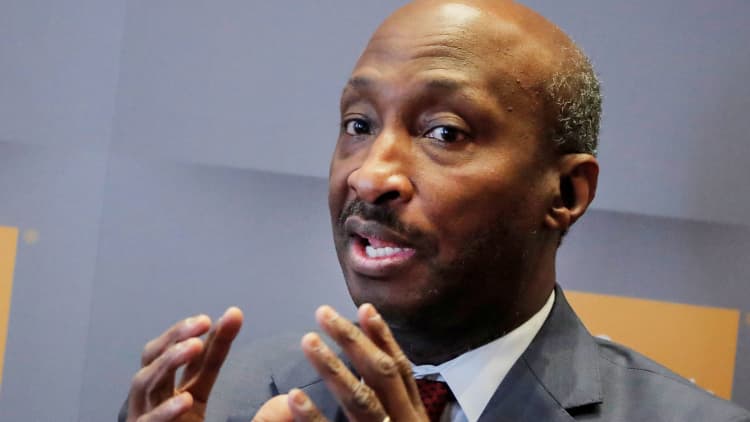Kenneth Frazier's resume is impressive.
Not only does he have a degree from Harvard Law School, but he climbed the corporate ranks at pharmaceutical giant Merck to hold positions from senior vice president and general counsel to president and now CEO and chairman of the board.
Frazier, 66, announced Thursday he would be retiring on June 30, to be succeeded by Chief Financial Officer Robert Davis and will continue to serve on Merck's board as executive chairman "for a transition period to be determined by the board," the company said.
He also sits on boards including Weill Cornell Medicine, Exxon Mobil Corporation and Cornerstone Christian Academy in Philadelphia and is a member of the American Academy of Arts and Sciences, the American Philosophical Society and Council of the American Law Institute to name a few.
His success has made him a thought leader on topics ranging from developing a coronavirus vaccine to what it means to be black in America. And Frazier says he would not be where he is without the educational opportunities he was afforded as a kid.
"I get to sit on CNBC and have this conversation with you because of one fundamental reason," Frazier told CNBC's "Squawk Box" on June 1.
"And that was when I was growing up in the inner city of Philadelphia, the social engineers in Philadelphia at the time — when [Dr. Martin Luther King Jr.] was leading the protest in the 1960s — for reasons I don't yet understand, decided to take a few inner city black kids, put them on a bus [and] make them ride 90 minutes to different schools to get a rigorous education."
Being bused to a better school changed his life, Frazier said.
"I know for sure — that would put my life on a different trajectory," he said. It "was that someone intervened to give me an opportunity to close that opportunity gap."

Federally mandated desegregation busing was used as a tool to integrate black children into predominantly white schools starting in the late 1950s after the Supreme Court found in Brown vs. Board of Education that segregated schools were unconstitutional.
The school Frazier was bused to, for example, "had 1400 kids in it. There were nine African-American kids," he said.
Busing was historically controversial among whites, and still has been in modern times.
(Recently, busing became a topic in the 2019 Democratic presidential debates as California Senator Kamala Harris, 55, who as a child was bused to school in Berkeley as part of the district's voluntary program, confronted former Vice President Joe Biden about his record of opposing mandatory busing in the '70s and '80s. Biden said he was opposed to using forced busing as a remedy for "de facto" segregation but supported it as a measure to remedy segregation created by law or policy.)
Yet still today, "we need to acknowledge that there are huge opportunity gaps that are still existing in this country" between black and white Americans, Frazier said.
"Even though we don't have laws that separate people on the basis of race anymore, we still have customs, we still have beliefs, we still have policies, we have practices that lead to inequity."
Education is "critical" to closing those gaps, he said.
"That is the great equalizer. We always say we are a land of opportunity, and opportunity in a knowledge economy comes through education and training," Frazier said. (A knowledge economy is one in which information and technological advancements are crucial to the production and consumption of goods. Think of the proliferation and importance of goods and services like software and SaaS systems in the current economy, for example.)
Frazier's comments came as protests against racial injustice spread across the United States in response to the death of George Floyd.
"I think we all know that in good times when the community is quiet we can ignore it, we can go about doing what we believe is in our economic self interest. But in the long run, what's in our enlightened economic self interest is that for all Americans to feel ... like they're participants in our economy," Frazier said.
"Joblessness leads to hopelessness," so businesses can "step up" and lead in the healing, according to Frazier.
"Our society is more divided than it's ever been. We live in our own separate camps and enclaves," he said. But "you could actually argue that the workplace is the last place in America besides the military, and maybe sports, where people can't choose who they associate with, so we as business leaders can step up and solve many of these economic problems for people."
To that end, "leaders in the business community can be a unifying force. They can be a source of opportunity. They can be a source of understanding," Frazier said.
This story has been updated to reflect Frazier's retirement.
See also:
Barack Obama: This is what you can do to reform the system that leads to police brutality
Twitter billionaire Jack Dorsey on giving away his money: 'If someone is in pain, I am in pain'
Check out: The best credit cards of 2020 could earn you over $1,000 in 5 years



